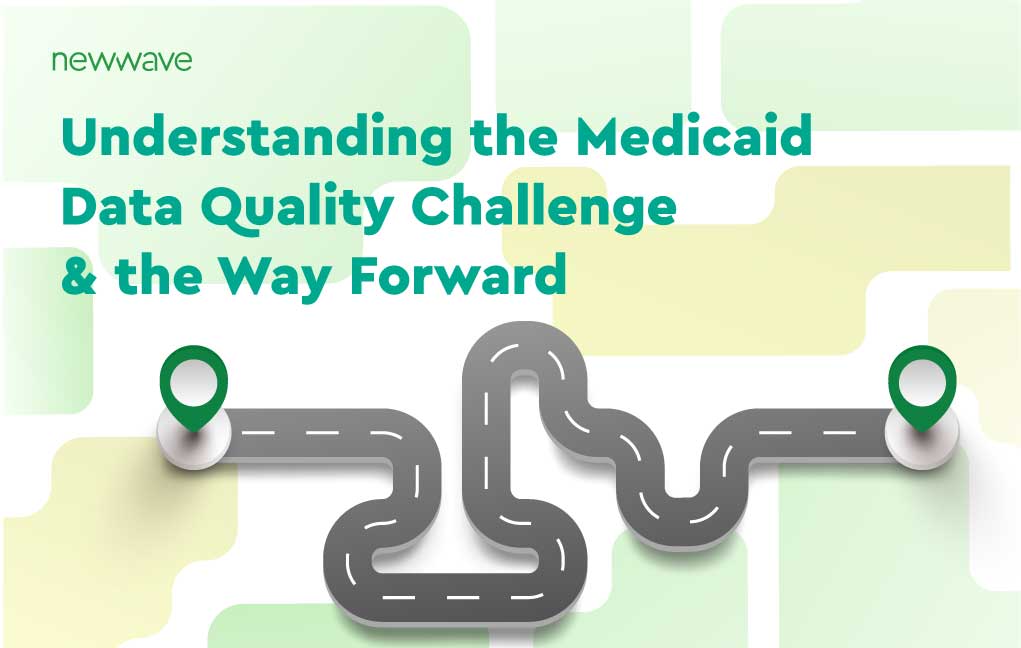NewWave’s Greg McGuigan, Executive Vice President, and former Deputy Director for the Data Systems Group at CMS, speaks about Medicaid’s T-MSIS Data Quality Challenge and how NewWave and Mathematica are changing the game to transform Medicaid Data Quality
NewWave: Can you share some background on the history of the Medicaid data submission process and how Transformed Medicaid Information System (T-MSIS) data is used?
McGuigan: There was previously a system called the Medicaid Statistical Information System (MSIS) which, for well over a decade, collected Medicaid data from all the states in a flat file format. Over time, Medicaid programs evolved. Medicaid programs offered different benefits. Many shifted from fee-for-service to a more managed-care model. The MSIS dataset did not keep pace with these programmatic changes. The MSIS dataset became outdated. The Centers for Medicare and Medicaid Services (CMS) through the Center for Medicaid & CHIP Services (CMCS), worked directly with states and CMS stakeholders to define a new format called T-MSIS: a more complete dataset that considered current and future trends in healthcare. The thought was that T-MSIS would become a more accurate, timely, and complete source of Medicaid data, serving as the center for all Medicaid analysis within CMS.
NewWave: What are some of the challenges with T-MSIS data and the way it is processed?
McGuigan: The Medicaid program is built on federal regulation but administered by individual states. Federal regulation allows states flexibility in creating and running their Medicaid program. For example, states communicate how they will run their Medicaid program through State Plan Amendments, which define the Medicaid program within a state, and Medicaid waivers, which allow states flexibility to test and deliver its own unique Medicaid programs specifically tailored to that state. Although the Medicaid program is based on a set of guidelines, when you take into consideration the fact that states have the ability to really customize their program (under State Plan Amendments and waivers), you find that all the states manage a similar program, but unique for each state. Over time, we have seen Medicaid programs grow to be much larger than ever before. When we start looking at things like value-based care, cost, and the quality of care, it has become much, much more important that the quality of the data being sent to CMS for evaluation is timely, accurate and complete.
NewWave: CMS has signaled through its guidance that T-MSIS data quality is a priority. Will CMS increase its scrutiny of T-MSIS data in the near future?
McGuigan: Through a series of state health official letters, we have seen CMCS really start to scrutinize the quality and completeness of state T-MSIS data. It is also important to remember that not all data is equal. What CMCS did was put more emphasis on certain data to have states target priority areas and focus state data quality on those key performance areas. CMS is tying states adherence to the top data priorities to the enhanced funding that goes back to states to support the Medicaid Systems Operations, to state compliance for these top-quality areas, and respective improvements.
NewWave: As the former Deputy Director for the Data Systems Group within CMCS, what has been your experience with seeing the development of MSIS and T-MSIS and states’ response to submitting these data?
McGuigan: All states want to comply with CMCS regulations; however, most states continue to be hampered because of their antiquated legacy systems. If states have multiple legacy systems, they are not integrated together. Not all the states are technologically advanced to where they have an enterprise data warehouse with advanced tools which leverage powerful data analytics and artificial intelligence to validate the quality of the data across their programs.
When CMCS required states to submit their T-MSIS data, most struggled to pull the information from all these distinct legacy stovepipe systems. Once they were able to do so, CMCS used data quality measures to assess the completeness and accuracy of the data. Even though CMCS provided data dictionaries, a preferred file layout and technical assistance to support T-MSIS submission, the states just did not have the resources, infrastructure, or advanced tools to provide complete, accurate and timely Medicaid data. For the states to truly improve their Medicaid data quality, they need advanced analytics that clearly show how CMCS is evaluating and processing the state submission.
NewWave: Your journey has led to the creation of a one-of-a-kind Medicaid data quality solution based on the leading-edge technology that is available in the field right now. How will Imersis help states?
McGuigan: The whole thought in my mind was to give states the ability to assess their own data quality before it is submitted to CMS. We wanted to empower each state to drill down to the record level to identify data quality problems in a quick iterative fashion and help each state address the data quality problems CMS is flagging in T-MSIS.
NewWave and Mathematica have joined forces to create this service for states though Imersis: a cloud-based data quality tool designed to help state Medicaid agencies prepare T-MSIS data for advanced analytics and meet federal data quality requirements.
Imersis is the product of a collaboration between NewWave and Mathematica, two companies with decades of experience working with CMS and Medicaid Data. NewWave is re-imagining technology with a new synthesis of products and services for this era of disruptive change in healthcare. Imersis leverages NewWave’s cloud engineering, systems integration and technical architecture expertise and Mathematica’s deep understanding of state Medicaid operations and T-MSIS data. Imersis is a game changer for states to improve data quality and meet federal data quality requirements.
NewWave: What is the future of Imersis?
McGuigan: This work really puts the power back in the hands of the states. They will have complete control of their data quality. I am very excited about what this tool means, not only to NewWave and Mathematica, but to the states and their ability to comply with regulations and prepare their data for reliable and sophisticated analytics.
I think improving data quality is just the start. We know the government is changing. How states are purchasing healthcare and evaluating outcomes is changing. For a state to be effective, data quality now becomes key. It all centers on data quality and producing a platform that empowers states to have complete control of their Medicaid Data Quality and is a critical step in preparing for the ever-changing healthcare landscape.
—
NewWave and Mathematica will host a webinar to commemorate the launch of Imersis on Jan. 14, 2021 at 3:00 pm EST. The virtual event will include keynote presentations by executive leaders of NewWave and Mathematica, an Imersis demonstration, and Q & A with the leading experts behind the Imersis platform.
Register for the webinar and learn more about Imersis at www.mathematica.org/toolkits/imersis


